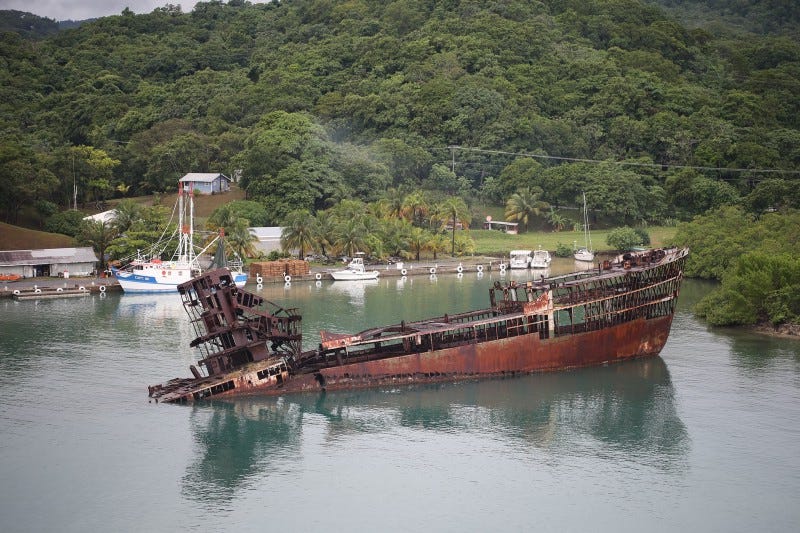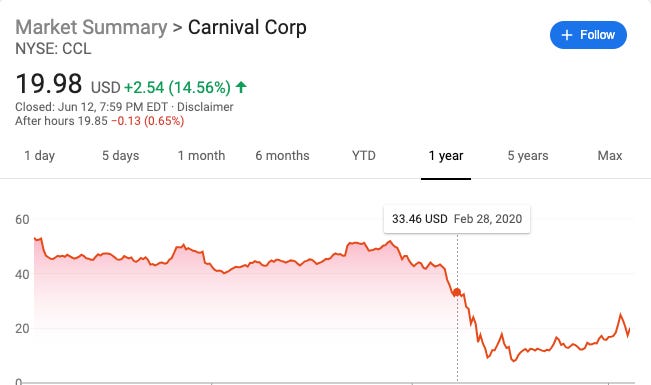What I learned from a bad decision to buy Carnival Cruise stock in February
Back in February, I made an investment that I thought was a steal. Carnival Cruises had gone down to around $33, after previously being as…

Back in February, I made an investment that I thought was a steal. Carnival Cruises had gone down to around $33, after previously being as high as $53. The stock paid a huge dividend and I was sure that I had easy money once the whole COVID-19 hype died down.
Within just a few weeks, my hopes were shattered. Shelter-in-place started in my home state of California and in other states all across the country. The stock market was in freefall and travel companies like Carnival fared the worst.

Discussing this company in detail gives us a great perspective on how COVID-19 and actions by the Federal Reserve have affected the travel industry. So let’s talk about what’s been happening with Carnival in the past few months.
Cruise ships and COVID-19
The cruise industry is one of sectors that has been hit the hardest by the pandemic. This has happened for a simple reason: If you do choose to go on a cruise, you’re taking a serious risk with your health.
Cruise ships have been described as perfect breeding grounds for COVID-19. Since cruise ships have so many people in close contact with each other for prolonged periods of time, it’s really easy for viruses to spread. Ships owned by Carnival including the Diamond Princess and the Grand Princess ended up having hundreds of cases and people getting quarantined for weeks.
Cruise ships were such hotbeds for viral spread that the government needed to take action. In April, the CDC put up a “no sail order” preventing cruise ships from operating as a public health precaution. Obviously, that was not good news for companies like Carnival.
Why’d you buy the stock, you moron?
I know at least a few of you are thinking this. So let me take a minute to defend myself.
It’s kind of hard to remember now, but back then, people were acting like COVID-19 was media hype just like Ebola before it. Human beings have a tendency to extrapolate the future based on what’s happened in the past, and the vast majority of people expected that COVID-19 would just disappear like other diseases that got lots of media airtime. In my defense, very few people were expecting lockdowns to happen in America.
Plus, I read this article by NYU Professor Scott Galloway about why Carnival Cruises was a great investment. There are some great points here: the cruise industry has seen good amounts of growth in recent years and the industry is indirectly subsidized by the government since Boomers spend their Social Security money on cruise tickets. Of course, he made the mistake that I did when it came to underestimating the severity of COVID-19.
All that being said, it really shouldn’t have been a surprise to me how bad COVID-19 turned out to be. In January, China decided to lock down more than 57 million people in order to prevent further spread. Obviously, hindsight is 20/20, but if the authoritarian Chinese government was willing to handicap its own economy like that, it should have been obvious that we were dealing with something serious.
So yeah, I guess I kind of am a moron.
How did Carnival Cruises survive?
For a while, it looked like Carnival had no hope of surviving without a government bailout. Maintaining a fleet of cruise liners isn’t cheap and the company said that it was spending about $1 billion a month on operating costs. Meanwhile, the company was making no revenue.
Even though the company didn’t get a bailout, it was able to survive because of two other lifelines. Carnival Cruises got more money in equity investments and got some indirect help from the government.
In April, the company sold 71,875,000 shares of common stock at $8 per share. Saudi Arabia’s Public Investment Fund bought much of this stock and ended up taking an 8% share in the company. It looks the Saudis are expecting that if they give Carnival the money it needs to stay afloat now, they’ll get a huge return on their investment once travel goes back to a pre-COVID normal.
So, why didn’t Carnival get a government bailout? The answer is that it wasn’t allowed. The terms of the CARES Act said that only companies that were headquartered in America could receive bailout money. Meanwhile, Carnival’s headquarters are in Panama so that the company can avoid paying American taxes.
But just because Carnival didn’t get a bailout, didn’t mean the government couldn’t help the company in any way. As you probably have heard, the Federal Reserve printed out $8 trillion and started using this money to stabilize the debt markets, buying corporate debt that other people wouldn’t touch in order to ensure that companies wouldn’t go bankrupt and further cripple the American economy.
This meant that companies like Carnival, which didn’t get money from the Fed directly, were able to raise debt on better terms than they would have gotten otherwise. Originally, it seems that the company was looking for a deal that would have made it take on crippling debt with more than a 15% interest rate. Instead, Carnival received more favorable terms.
In total, the company received $6.25 billion in debt and equity, which gave it the runway it needed to survive. For now, it seems that the threat of bankruptcy has been reduced significantly. The company’s CEO has said that Carnival would be able to survive even if the company didn’t produce any revenue for the rest of the year.
The rise and fall again of the travel industry
This week, I was briefly hopeful that my Carnival investment might finally be in the green. Carnival’s price went back up to $24 on Monday and I was in a good mood.
For a second, it looked like the travel industry was back. While airline travelers reached a low of less than 90,000 back in April, the number hit 440,000 last Sunday.
But then, Carnival’s stock tanked again in the middle of the week. The travel industry as a whole took a dip on news of increased COVID-19 infections in states like California, Florida, and Arizona.
That wasn’t the only bad news for Carnival. Cunard, one of the cruise line companies owned by Carnival, announced that it was canceling all cruises until November 1. The company doesn’t want to resume sailing until it develops health protocols with the CDC and Public Health England. While other cruises that Carnival owns are still set to get started on August 1, who knows if those will be canceled too.
As a result, Carnival’s stock went back down to $17 and my dream of finally being positive on this investment faded.
But hey, it’s not all bad news for Carnival. While there’s absolutely no way that I would ever go on a cruise ship before there’s a vaccine, there are plenty of people out there that would. Carnival’s bookings were up 600% in August 2020 compared to August 2019.
Am I going to sell my shares?
I’ve decided that I’m holding my Carnival Cruises stock. Honestly, I’ve got a pretty low percentage of my overall net worth on Carnival, so it wouldn’t be a huge deal for me even if there was a worst-case scenario and I lost all my money. But thanks to my friends at the Federal Reserve and in the Saudi royal family, I think I should be fine.
Even though the stock is going to be crazy volatile over the next few months, I sincerely doubt that Saudi Arabia will let its investment go to shit. On the other hand, Carnival is carrying significantly more debt than they were a few months ago and this will hurt the company’s future growth.
Honestly, I’ve already held on for this long. I’m willing to just keep going and see where this takes me.
Liked what you read? Sign up for our newsletter here.


